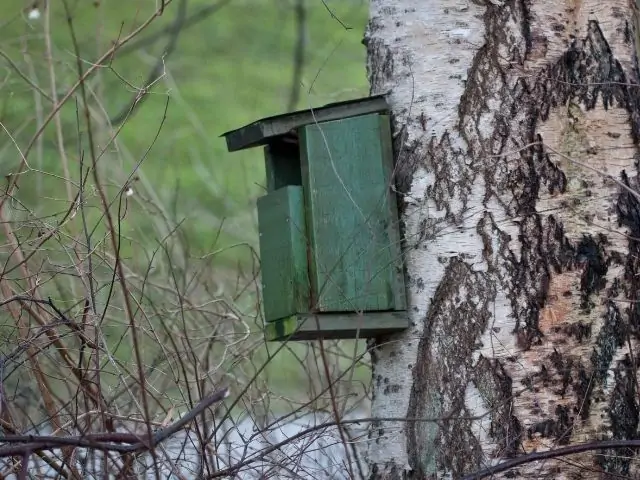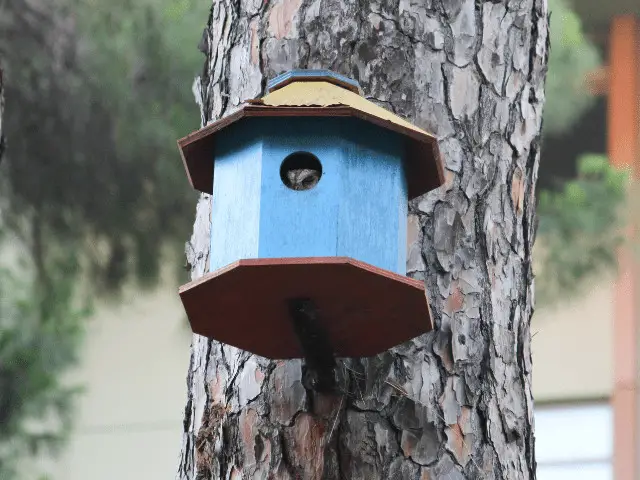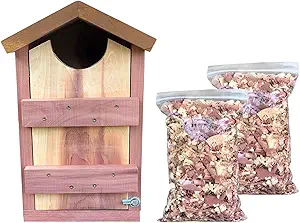Owls do not create their nests, so providing suitable habitat for them may let you see one up close!
On top of that...
This is also a great way to enrich your local ecosystem and eliminate pests in your backyard like rodents. So, we reviewed the top five owl nesting boxes that you can use to attract different owls!
However, the JCs Wildlife Screech Owl or Saw-Whet Owl House is the best one yet, especially for small owl species.
Top 5 Best Owl Nesting Box Reviewed
1. JCs Wildlife Owl House - Best Overall
The JCs Wildlife Screech Owl or Saw-Whet Owl House from Indiana is handmade with cedarwood, while its roof is made of the recycled poly lumber.
Overall, it measures 11.375x14.25x10.125 inches - an affordable home for small owl species!
The entrance hole measures 4x3 inches, located right below the roof. There are three footholds to help owls up the entrance.
Finally, the base of the box has a hole for water drainage and air circulation.
Pros
- Affordable
- Made of durable and recycled materials
- Easy maintenance
- Safety features
- Comes with pine shavings
Cons
- Hard to install
- Large footholds may attract squirrels
Takeaway
You can't go wrong with an affordable model like the JCs Wildlife Owl House. It has everything a small owl needs for nesting!
2. KingWood Premium - Best Material And Structure
The KingWood Premium Cedar box is built to last through all types of weather.
Its exterior measures 25x11x11 inches, specifically designed for families of smaller owls like the Western Screech Owl, Eastern Screech Owl, and Saw-Whet Owls
On its exterior, the entrance hole measures a large 6x6 inches for sunbathing and observation, and its sides are flared for better security. Beneath the entrance is two rail steps for an easy landing.
The roof and base of the box are made for proper water drainage and air circulation.
There is also a knob you can pull to open up the box's base and clean up the owls' debris.
Pros
- Sturdy cedar material
- Many safety features
- Easy maintenance
- Interior structures
- Comes with installation tools, instructions, and pine shavings
Cons
- Expensive
- Doesn't accommodate large owls
Takeaway
If you're willing to invest, the KingWood Premium Cedar Owl House is an excellent choice. The small owls it houses can also get rid of the rodent population in your area!
3. JCs Wildlife Platform - Best Barn Owl Nest Box
The JCs Wildlife 3 Sided Platform Barn Owl box is built for the outdoors, as it is constructed with exterior-grade plywood and treated with linseed oil for extra protection.
The box measures 21x24x19.25 inches, providing plenty of space for the Barn Owl hatchlings.
Its safety features include drainage holes, ventilation holes for heat circulation, and a small elliptical entrance hole measuring 4.5x5.5 inches to protect the nest from predators.
It also comes with a three-sided exercise platform to assist owlets as they practice flight.
Maintenance is also simple as the side of the 3 Sided Platform Barn Owl’s box has a clean-out door to access the interior.
Pros
- Large and durable plywood
- Many safety features
- Easy maintenance
- Comes with installation tools and pine shavings
Cons
- Heavy
- Expensive
- Large platform may attract squirrels
Takeaway
This JCs Wildlife box with the 3-sided platform is an excellent habitat for the Barn Owl. Install it in a good location, and you might have a Barn Owl family visit you regularly!
4. Vundahboah Amish Goods - Best Versatility
The Vundahboah Amish Goods owl box in this list is made in Tennessee, featuring a weatherproof roof with the all-cedarwood construction.
It measures 15x8.5x9 inches, with a design that isn't limited to small owls - you can also attract Flicker species and the American Kestrel!
The entrance hole is right below the roof, with a slit along the top for air ventilation. There are also two footholds below the entrance.
Pros
- Weatherproof construction
- Easy maintenance
- Easy installation
- Comes with cedar shavings
Cons
- No mention of drainage system
- Large footholds may attract squirrels
Takeaway
The Vundahboah Amish Goods owl house has a weatherproof cedar design that is best if your area is known for many bird species!
5. Uncle Dunkels Premium House - Best Design
The Uncle Dunkels Premium Owl House has a unique feature that sets it apart from others - it's made of solid pine, tongue, and groove boards with a shingled roof.
The box's front panel is an entire tree bark that's ethically sourced, recycled, and treated. With this, the box blends in perfectly with the forest scenery.
As you may have guessed, this Uncle Dunkels’ model is designed for Screech Owls with its 12x12x19 inch dimensions.
Its other structural features, such as the entrance hole, floor, headspace, air circulation, drainage, and clean-out door, are
Pros
- Excellent wood design
- Safety features
- Easy maintenance
- Comes with installation tools and pine shavings
Cons
- No entrance grooves
- Doesn't accommodate larger owls.
Takeaway
If you're into design, then the Uncle Dunkels Premium box is a great pick. Not only are you accommodating to your local Screech Owls, but also the aesthetic of your forestry.
What You Should Look For In An Owl Box
Before buying a nest box, you should do some research first on the owl species present in your area because some designs favor specific owls.
Some of these specifications are:
Size

Apart from the nesting owls themselves, you also need to consider the number of hatchlings they produce, which can be a few to over a dozen.
A little owl stays in the nest until it is big and strong enough to fly on its own, so if there are multiple hatchlings in the nest, they can get cramped and smothered in no time.
For a medium-sized owl like the Barn Owl, a Barn Owl box measuring 24x18x18 inches should be enough for a breeding pair and their hatchlings.
You may need a bigger size to attract larger owls like the Barred Owl or the Snowy Owl.
Entrance Hole Location And Size
For starters, the entrance hole must always be positioned at least six inches above the box's floor to keep the hatchlings inside. They tend to be curious and explore around the nest, but it's far too dangerous for them to be exposed to the outside world.
Regarding its size, it depends on the resident bird. All cavity-nesting birds prefer a small entrance size because it protects them and their young from danger.
For example, even though the Barn Owl can barely squeeze through a 6x6 entrance, it's way too small for the Great Horned Owl and the barred owl.
Material
Typically, a commercial nesting box is made of plywood. However, there are other higher-quality options, such as untreated cedar, pine, and fir.
In any case, you need to make sure that the material is in good shape so the box can last in the environment but is also within your budget and convenience.
For example, a half-inch plywood rots quicker from heat and rain than a 3/4 to 1-inch plywood, but a thicker wood is more expensive, heavier, and harder to install.
The characteristics of the wood are also something to consider. For example, do not use pine wood if your area has high rainfall and humidity because termites can invade and destroy the box.
Lastly,
because it may contain glues and other chemicals that can be toxic.
Extra Features
In general, drainage holes are necessary for any nest box to prevent stagnant water and overflooding during a rainstorm.
Some designs also include some form of perch or footing, which can help the hatchlings train for flight. However, if your area has a big squirrel or raccoon population, these mammals may use it to compete for the box.
If you don't want to buy commercial nest boxes, building a custom design from scratch is an option, though you may need some serious carpentry tools. Here's a helpful video of a DIY nest box:
Frequently Asked Questions
How should I install the nestbox?
You want to securely install the nest at a high elevation (typically about 15 feet), with the entrance facing away from direct sunlight and rain. Meanwhile, the area of the installation depends on the owl species. For example, barn owls prefer open spaces with sparse trees. It would typically avoid a nest box in dense forests because that is the preferred habitat of the Great Horned Owl.
We also recommend placing the box where there's a steady supply of prey. Owls typically eat rodents such as voles and mice, though they can eat insects too.
If you plan on installing multiple nest boxes, then you may need to keep them far apart (about 1/2 miles) if you're hosting territorial species, like a barred owl or Tawny Owls.
How should I maintain the nestbox?
It's best to prepare the box before the breeding season, which happens around late winter. However, you can start maintenance once the owlets leave the nest, which is around fall. For your safety, bring a flashlight and a poking stick with you to check if there are still owls (or squirrels) in the box. You don't want an animal to jump at you while you're 15 feet above a ladder.
What should I do when an owl is nesting?
Be careful because many state and federal laws heavily protect all species of nesting birds. According to the U.S. Fish and Wildlife Service, disrupting or destroying nests, as well as taking the birds, the chicks, or the eggs in the nest, are punishable under the Migratory Bird Treaty Act (MBTA). Plus, owls are too high-maintenance to be kept as pets anyway. So, if you see a nesting owl, it's best to leave it alone.
To Wrap It Up
Once again, our pick for the best nest box is the JCs Wildlife Screech Owl or Saw-Whet Owl House.
The size of the box and the entrance hole are perfect for the small species it's designed for. With its entrance footholds, safety features, and easy maintenance, this box has everything you're looking for at an affordable price!
However, if you're willing to invest, the KingWood Premium Cedar Owl House is a great option due to its excellent construction.






